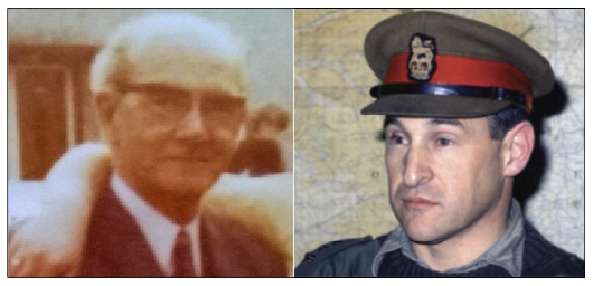In London tomorrow the family of a Belfast man murdered by loyalists more than 40 years ago will personally issue a legal writ against a former British Army officer.
Patrick Heenan (47) was killed when the minibus in which he was travelling to work was targeted by the UDA in East Belfast in February 1973. A grenade was thrown into the bus and the father-of-five immediately threw himself on top of the grenade, taking the full force and shielding the other Catholic workmen on board.
His wife Mary and son Eugene, with the backing of victims’ group Relatives for Justice and their legal team from Kevin Winters Law, will issue a writ against the Ministry of Defence (MoD).
Frank Kitson, who at the time of Mr Heenan’s murder was a Brigadier serving in the north, is specifically named in the writ. It’s believed to be the first time a member of the British Army has been named in a civil action. Now in his late 80s, Mr Kitson was in charge of military operations in the north during the early 1970s.
Mary Heenan, now aged 88, will make the journey to London to personally hand over the writ.
“Patrick was a good man. He was a deeply religious man who just lived for the five kids and me,” she said. “He was a devoted Pioneer within the church. He’d do anyone a good turn and was always helping neighbours. His selfless action in immediately thinking of others was just his way and had he not have done so then the fatalities and injuries would have been much worse.
“I take comfort in that at times, though I miss him terribly every single day. He would be so proud of his children and their achievements and of how they turned out.
“He was robbed of all of that and we were robbed of him. And to think that a government just instigated it all and covered it up makes it more unbearable. That’s why we need accountability.”
Patrick Heenan was overseeing the construction of a Catholic school in East Belfast as a foreman joiner. The Shaws Road man had been in the habit of driving his own car to work, but fearing for his safety, he began to use a bus that was transporting Catholic workers to the site.
Just a few months after the grenade attack, in May 1973, a British soldier, Albert ‘Ginger’ Baker, walked into a police station in Wiltshire, England, and confessed to the killing of Patrick and three other murders.
Baker was part of a UDA gang based on a model outlined in a manual written by Brigadier Kitson, ‘Gangs and Counter-Gangs’. The subsequent trial – the first of what became known as ‘supergrass trials’ – skirted around the issue of UDA killer gangs being run by the British Army and Baker received a life sentence. In subsequent prison visits, Baker spoke at length to Fr Denis Faul and Fr Raymond Murray of the Association for Legal Justice (ALJ) and also to the Labour Party’s Ken Livingstone, revealing his UDA activities and close links to British Military Intelligence.
RFJ Chairperson Clara Reilly said 43 years later the family are still hoping for justice.
“Families are under no illusion about the collusive acts that claimed hundreds of lives throughout the conflict,” she said. “And for these families Kitson’s manuals undoubtedly set the entire framework of the time and for decades to follow, ultimately leading to an unimaginable toll of human suffering and misery in which impunity was also systemic.
“Policy makers like Kitson should not be allowed to simply sail into the sunset after having played havoc with countless lives and consequently entire communities that are still living with and trying to come to terms with the awful consequences of his actions, actions that continue to be denied and where the bereaved and injured are vilified for daring to speak out.”






